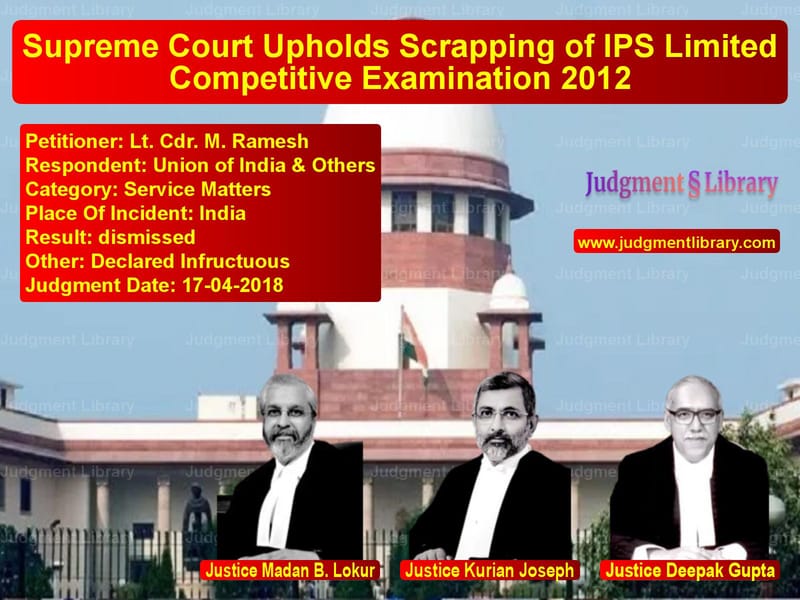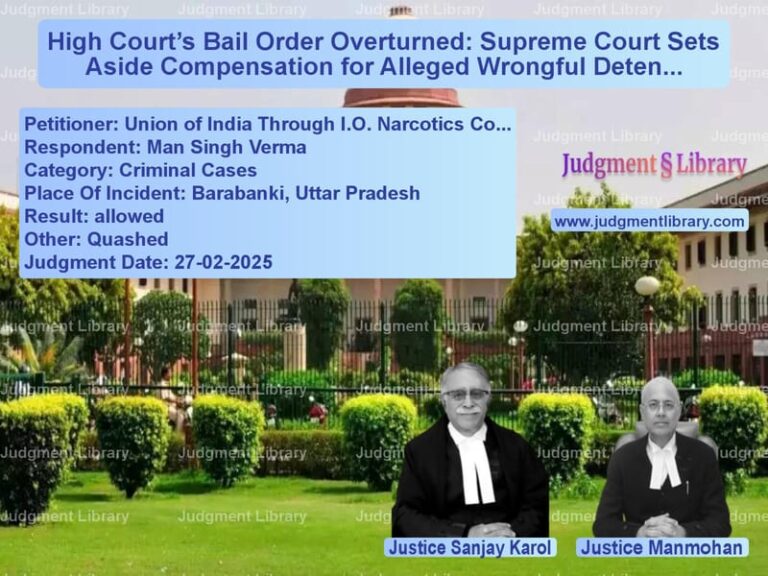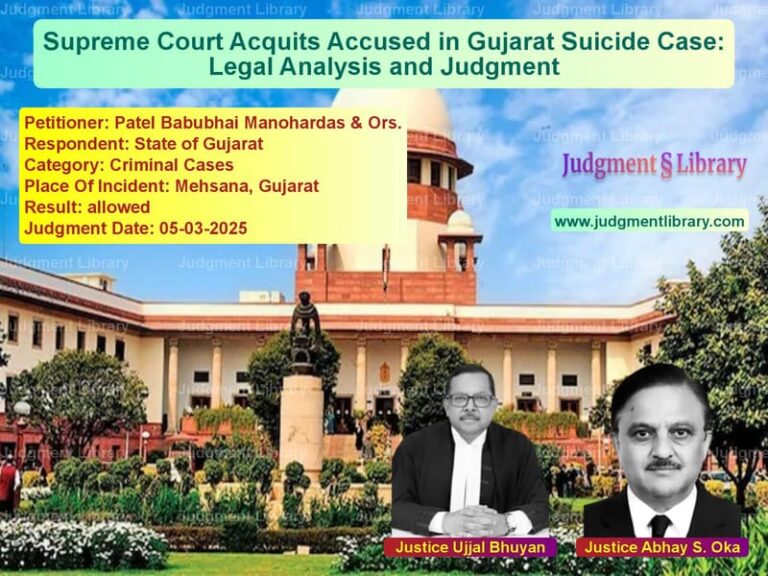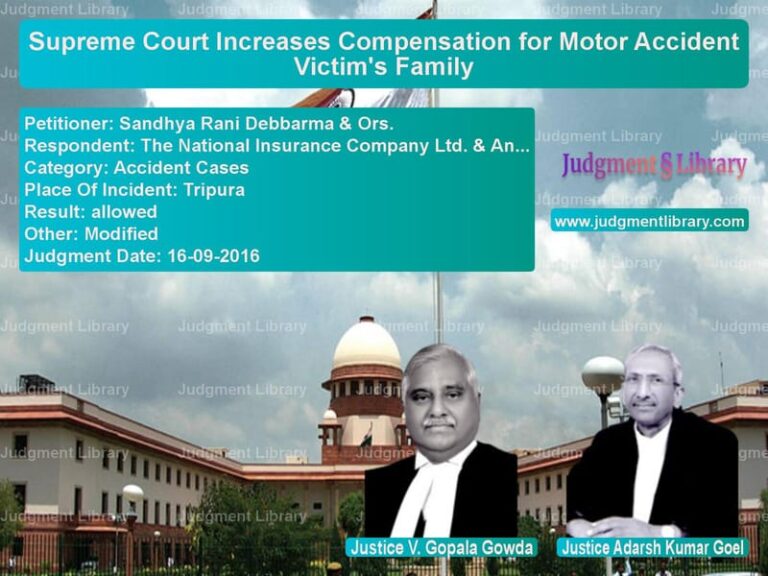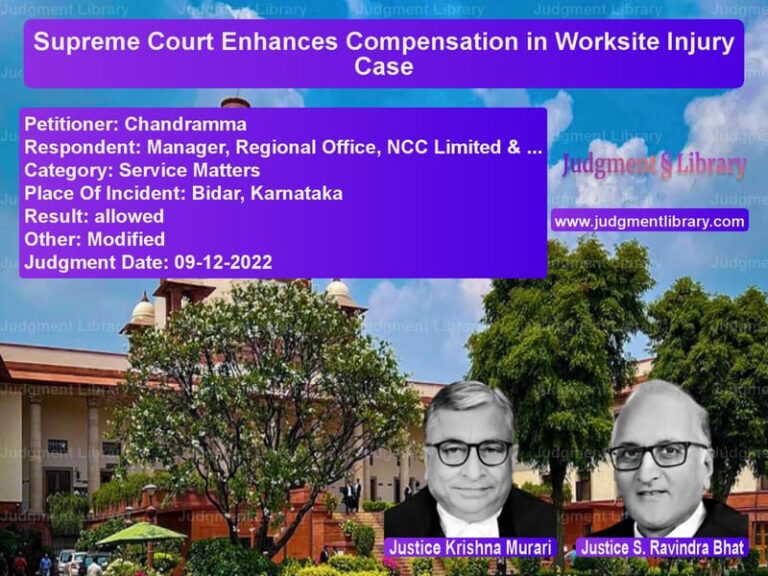Supreme Court Upholds Scrapping of IPS Limited Competitive Examination 2012
The Supreme Court of India, in the case of Lt. Cdr. M. Ramesh v. Union of India & Others, upheld the Central Government’s decision to scrap the Limited Competitive Examination (LCE) conducted in 2012 for recruitment to the Indian Police Service (IPS). The petitioners, who had appeared for the LCE, challenged this decision, claiming it violated their legitimate expectations of appointment.
The judgment, delivered by a bench comprising Madan B. Lokur, Kurian Joseph, and Deepak Gupta, found that the government’s decision was neither arbitrary nor discriminatory and was taken in the larger public interest.
Background of the Case
The case revolved around the Limited Competitive Examination (LCE) conducted between May 20 and May 22, 2012, to recruit officers into the IPS. The Union Government introduced the LCE as an additional recruitment method to address the shortage of IPS officers.
Key developments in the case:
- In 2011, the Indian Police Service (Recruitment) Rules were amended to allow recruitment through LCE.
- In 2012, the Union Public Service Commission (UPSC) conducted the LCE to fill up IPS vacancies.
- The results of the examination were never declared.
- Various High Courts and the Central Administrative Tribunal (CAT) delivered conflicting rulings regarding the validity of the examination.
- In 2018, the Government decided to cancel the LCE, citing multiple reasons, including a reduced vacancy percentage and litigation concerns.
Key Legal Issues
- Whether the petitioners had a legal right to demand the declaration of LCE results.
- Whether the Government’s decision to scrap the examination was arbitrary or discriminatory.
- Whether the principle of legitimate expectation applied to the petitioners.
Arguments Presented
Petitioners’ Arguments (LCE Candidates)
The petitioners contended:
- The Government’s decision was arbitrary and violated their legitimate expectations.
- They had prepared and appeared for the examination in good faith, expecting appointments.
- Scrapping the examination after six years was unfair and contrary to established legal principles.
- The vacancies in IPS still existed, and there was no valid reason to cancel the recruitment.
Respondents’ Arguments (Union of India)
The Government defended its decision, arguing:
- The LCE was introduced to fill an urgent shortage of IPS officers, but the vacancy percentage had since reduced.
- The examination process had been delayed significantly, rendering it impractical.
- Declaring the results now would lead to complex seniority disputes within the IPS.
- The cancellation was necessary to maintain administrative efficiency and avoid litigation.
Supreme Court’s Observations
The Supreme Court carefully examined the government’s reasoning and the petitioners’ claims.
No Vested Right in Selection
The Court reiterated the established legal principle that participation in an examination does not grant candidates an absolute right to appointment. It observed:
“It is well settled that merely because a person has been selected, does not give that person an indefeasible right of claiming appointment.”
Government’s Decision Not Arbitrary
The Court found that the Government’s decision to scrap the LCE was based on legitimate administrative concerns:
“The decision to scrap the LCE recruitment has been taken in the larger public interest. It is neither mala fide nor actuated by extraneous reasons.”
Legitimate Expectation Not Absolute
Addressing the petitioners’ claim of legitimate expectation, the Court held:
“Even if there is no vested right, the principle of legitimate expectation can be invoked. However, the Government is entitled to change its policy for good reasons, provided the decision is not arbitrary or capricious.”
Potential Litigation and Administrative Concerns
The Court acknowledged that declaring the LCE results after several years would lead to administrative complications:
“If appointments were made now, there would be seniority disputes between officers recruited through LCE and those recruited through direct recruitment or promotion over the past six years.”
Final Judgment
The Supreme Court ruled:
- The Government’s decision to scrap the LCE was valid and justified.
- The petitioners had no enforceable right to demand the declaration of results.
- The transferred cases were dismissed as infructuous.
- All pending applications and intervention requests were rejected.
Implications of the Judgment
- The ruling reaffirms the principle that mere participation in a selection process does not guarantee appointment.
- It upholds the Government’s authority to modify recruitment policies in response to administrative needs.
- The decision prevents potential litigation over seniority and appointment disputes within the IPS.
- The judgment serves as a precedent for future cases where recruitment processes are canceled due to changing circumstances.
- It highlights the importance of balancing individual expectations with broader public interest considerations.
This ruling ensures that administrative decisions regarding recruitment remain fair, transparent, and in alignment with evolving public service needs.
Petitioner Name: Lt. Cdr. M. Ramesh.Respondent Name: Union of India & Others.Judgment By: Justice Madan B. Lokur, Justice Kurian Joseph, Justice Deepak Gupta.Place Of Incident: India.Judgment Date: 17-04-2018.
Don’t miss out on the full details! Download the complete judgment in PDF format below and gain valuable insights instantly!
Download Judgment: Lt. Cdr. M. Ramesh vs Union of India & Oth Supreme Court of India Judgment Dated 17-04-2018.pdf
Direct Downlaod Judgment: Direct downlaod this Judgment
See all petitions in Recruitment Policies
See all petitions in Public Sector Employees
See all petitions in Employment Disputes
See all petitions in Judgment by Madan B. Lokur
See all petitions in Judgment by Kurian Joseph
See all petitions in Judgment by Deepak Gupta
See all petitions in dismissed
See all petitions in Declared Infructuous
See all petitions in supreme court of India judgments April 2018
See all petitions in 2018 judgments
See all posts in Service Matters Category
See all allowed petitions in Service Matters Category
See all Dismissed petitions in Service Matters Category
See all partially allowed petitions in Service Matters Category

